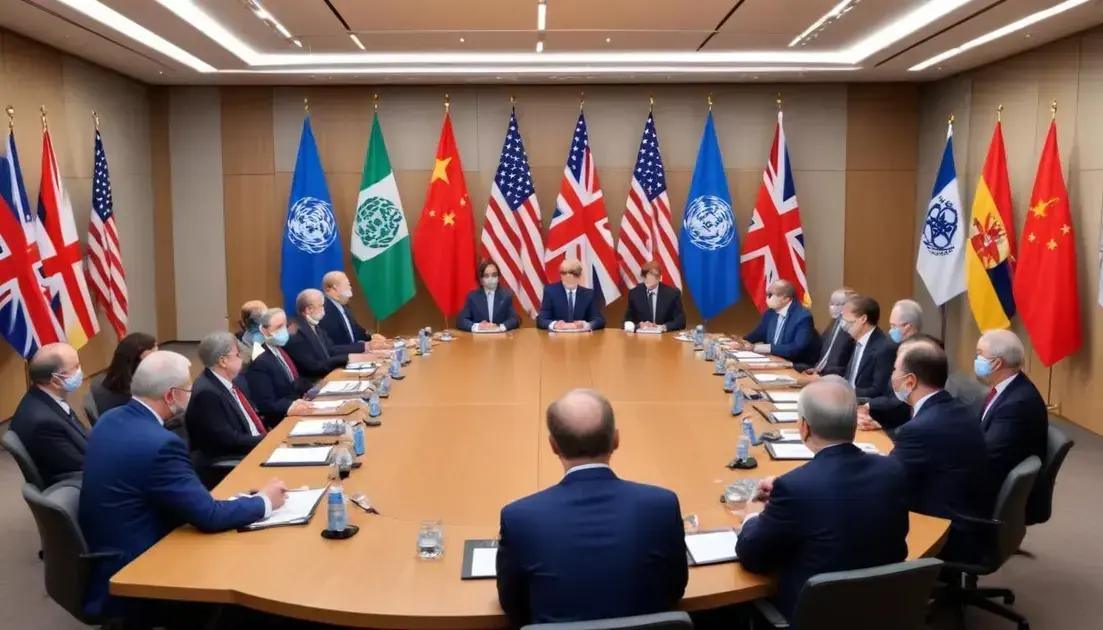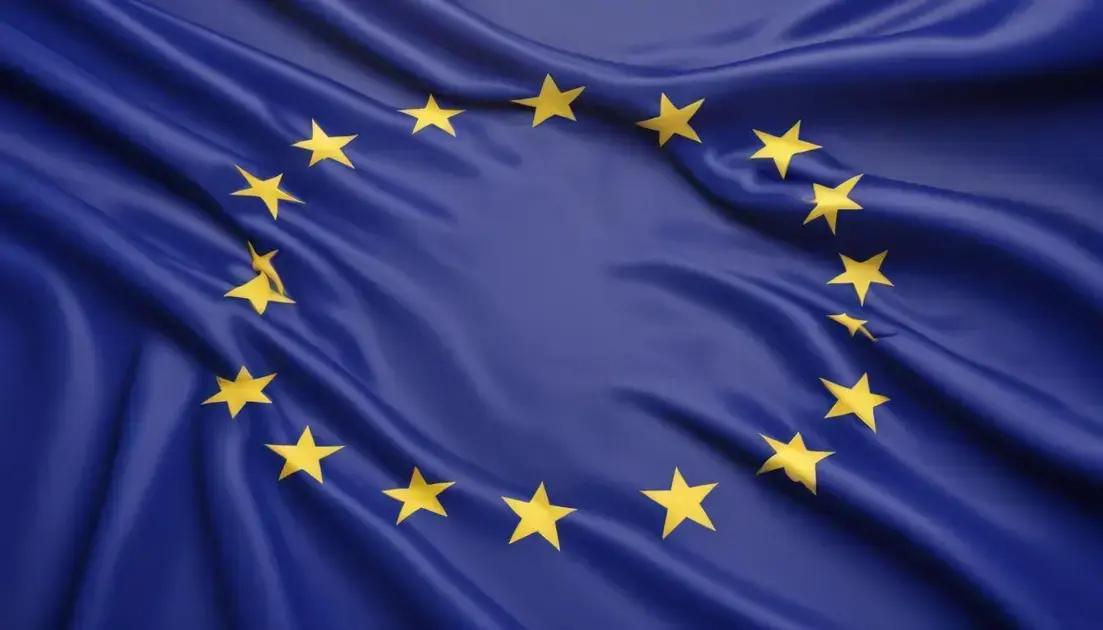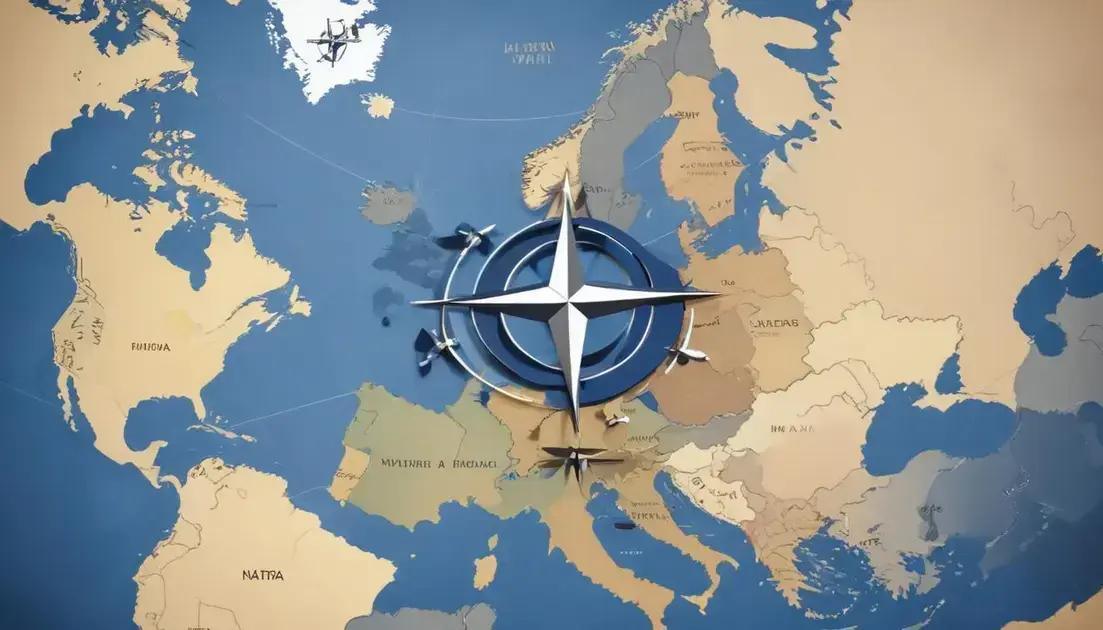
The Pandemic and the Redesign of World Politics
The future of diplomacy is changing rapidly due to COVID-19, emphasizing digital tools and global collaboration. As health and climate issues become focal points, nations are adapting their foreign policy strategies and entering new partnerships. Shifts in power dynamics are reshaping alliances, making flexibility and understanding crucial for effective diplomacy in addressing global challenges.
COVID-19 has not just changed our daily lives; it has fundamentally altered the landscape of world politics. Have you noticed how some countries have reinforced their ties while others seem more isolated? Let’s delve into how this pandemic reshaped international relations…
The impact of COVID-19 on global governance
The impact of COVID-19 on global governance has been significant. As countries faced a crisis, how they responded varied widely. Some nations strengthened their ties with international organizations, while others turned inward, focusing on national interests.
Increased Collaboration
Many countries, citing the pandemic, worked together to share data and resources. This collaboration led to faster vaccine development and distribution. It also improved communication between nations, showing that teamwork can make a difference.
Nationalism and Isolation
However, the crisis also fueled rising nationalism. Some leaders prioritized their citizens over global responsibility. This shift raised concerns about isolationism, leaving global issues unaddressed and creating divisions among nations.
Changes in Global Power Dynamics
COVID-19 changed power dynamics too. Emerging economies stepped forward, demonstrating resilience and adaptability. Countries like China and India played key roles in supplying medical equipment and vaccines to the world. In contrast, traditional powers faced criticism for their handling of the crisis.
These shifts in global governance affect everything from climate agreements to trade relations. Nations must adapt to a new reality where cooperation and conflict coexist, reshaping how we view international relationships.
The Role of Technology
Technology has also sped up changes in global governance. Virtual meetings replaced face-to-face summits, making global discussions more accessible. Yet, this shift emphasizes the digital divide, as not all nations can participate equally.
In the end, the pandemic reminds us that global governance is essential. Challenges like health crises require collective action, even if countries sometimes act alone. Understanding these impacts is key to navigating our future.
Changing international alliances
Changing international alliances have been a key theme during and after COVID-19. As countries faced the pandemic, they reassessed their partnerships. Old alliances have shifted, and new ones formed to tackle global issues.
Shifts in Alliances
Some nations turned to their traditional allies for support, while others sought new partners. For example, countries like India and Australia strengthened their ties for better economic cooperation and security. This shift highlights the need for nations to adapt quickly.
Emerging Partnerships
We’ve also seen new coalitions arise. Countries in the Asia-Pacific region are working together more closely. This is partly due to shared challenges, such as health and security threats. Collaborative efforts help promote stability and resilience.
Impact on Global Politics
These changing alliances affect global politics. Nations now understand the importance of being flexible in their partnerships. They must be ready to pivot as conditions change. This adaptability will be crucial in navigating future crises.
Additionally, alliances can lead to strategic advantages. Countries collaborating on health initiatives or trade agreements can increase their global standing. It shows that unity is essential for addressing complex problems that transcend borders.
The Role of Technology
Technology also plays a vital role in these evolving alliances. Video conferencing and online platforms have made communication easier. This allows countries to discuss issues and coordinate responses more effectively, even at a distance.
Changing international alliances reveal the dynamic nature of global relations. Nations are learning to navigate this complex landscape. They’re adapting to new realities and recognizing that cooperation can yield benefits for all involved.
Emerging power dynamics post-pandemic
Emerging power dynamics post-pandemic reflect how nations are reshaping their roles in the world. With the challenges brought on by COVID-19, countries are reevaluating their influence and strategies.
New Global Leaders
Some nations have risen in prominence during the pandemic. For instance, countries like China have increased their global presence by providing aid and vaccines to others. This has changed how we view global leadership.
Shifts in Influence
We also see shifts in influence among traditional powers. The United States faces competition, especially in areas like trade and technology. Other countries are stepping up to fill gaps left by traditional leaders.
The Role of Regional Powers
Regional powers are gaining more clout, too. Nations in the Middle East and Asia are forging stronger alliances, working together on security and economic plans. These collaborations show a move toward more decentralized power.
Additionally, smaller nations are finding their voices. They are advocating for stronger roles in international forums, emphasizing that everyone deserves a say. This shift can lead to a more balanced global landscape.
Impact on Global Issues
The changing power dynamics affect global issues like climate change, trade, and health. Countries must navigate these shifts to address problems that cross borders. Collaboration will be key, as issues don’t respect national lines.
As these power dynamics evolve, nations need to be strategic and open to change. Adapting to new realities will be essential for maintaining influence and addressing future challenges.
The future of diplomacy in a redefined world
The future of diplomacy in a redefined world looks very different. With the lessons learned from COVID-19, nations must adapt their approach. Traditional methods of negotiation are evolving rapidly.
Value of Digital Diplomacy
Digital tools are now essential for diplomatic efforts. Virtual meetings have become the norm, allowing leaders to connect easily. This makes discussions happen faster and more frequently. Countries can collaborate in real time, no matter where they are.
Focus on Global Health
Health issues have entered the diplomatic arena. Countries now recognize that global health impacts everyone. Diplomacy will involve coordinating responses to health crises. This can lead to better preparedness for future outbreaks.
Climate Change and Diplomacy
Climate change will also shape future diplomacy. Nations will need to work together to tackle this urgent challenge. Agreements on emissions reductions and sustainability will take center stage in discussions.
Countries that lead in green technology may gain more influence. Collaborations on renewable energy could change the dynamics of power.
Shifts in Power Dynamics
As power dynamics change, so do relationships. Emerging powers are stepping into new roles. This can shift alliances and create unexpected partnerships. Diplomacy will need to be flexible to navigate this changing landscape.
In this new world, diplomacy will be about collaboration, understanding, and innovation. Countries that embrace these principles will thrive and better address complex challenges together.
Conclusion
In conclusion, the future of diplomacy in a redefined world is all about adaptation and collaboration. As we face new challenges, countries must embrace digital tools and innovative strategies to connect effectively. Health and climate issues are now critical parts of diplomatic conversations, requiring a united effort.
As power dynamics shift, nations need to be flexible and open to new partnerships. The ability to work together on global challenges will shape a safer, healthier future for everyone. By prioritizing cooperation and understanding, countries can navigate the complexities of our modern world successfully.


